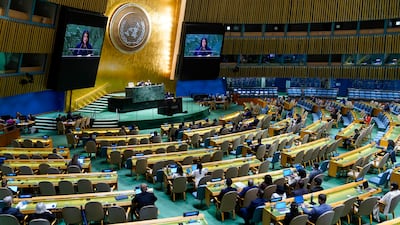If one is to read between the lines at the 78th UN General Assembly, there seems to be a quiet acknowledgment of the decline of the organisation and its institutions. This, at a time when groupings outside of the UN – such as Nato and the GCC – have grown in importance on the international stage.
US President Joe Biden failed to fill the void left by the absence of the leaders of China, France and Russia, all of which are permanent members of the UN Security Council. Despite Ukrainian President Volodymyr Zelenskyy addressing the assembly in person for the first time since the full-scale conflict with Russia began, his speech was underwhelming, particularly given the inconclusive equations on the battlefield.
Notably, Arab leaders and officials turned their attention to issues such as climate change and emerging technologies. Instead of using the stage to voice their criticisms, as some leaders sometimes did in the past, most of them presented initiatives and proactive positions.
Of course, traditional issues directly concerning them inevitably found their way into meetings and conferences both inside and outside the UN.
Jordan’s King Abdullah, for example, called on the UN’s members states, and its institutions, to once again focus on the escalating flow of refugees into his country as well as Lebanon due to recent developments in Syria.
At the Middle East Global Summit, held on the sidelines of UNGA, King Abdullah addressed the issue of Syria’s displaced people from the perspective of the Jordan-Lebanon bilateral relationship. This is a useful approach for both countries, especially due to the international community’s tendency to focus on the consequences of the Syrian refugee influx on Europe.
King Abdullah’s candour was notable when he said that the Syrian regime had not met the demands of the so-called “step-by-step” approach to resolve the conflict as well as the continued smuggling of drugs and weapons across the border.
What this means for Syria’s gradual rehabilitation into the Arab fold is difficult to say. But amid the regime’s struggles to resolve its outstanding problems, it continues to receive support from Iran and Russia. China and Syria, meanwhile, announced a strategic partnership during Syrian President Bashar Al Assad’s visit to Beijing over the weekend.
Iran and Russia have their own priorities in Syria. Talks during Russian Defence Minister Sergei Shoigu’s trip to Tehran last week covered the conflicts in Syria and Nagorno-Karabakh, with a commonly held view to stabilise the situations in both regions.
Mr Shoigu’s visit highlighted Russia’s intention to strengthen relations with Iran as well as North Korea, both of which have hostile relations with the US. It’s worth recalling that Mr Shoigu played a key role in getting Moscow closer to Pyongyang, with his efforts culminating in a meeting between North Korean leader Kim Jong-un and Russian President Vladimir Putin last week.
The minister aimed to convey to Tehran that Moscow is an ally, and that Washington cannot be trusted. Indeed, Russia seeks to block US attempts to draw Iran away from it through gradual dealmaking. This includes the recent prisoner exchange agreement in return for releasing $6 billion in frozen Iranian assets.
Tehran is not necessarily optimistic about the prospects of US-Iran reconciliation, but it continues to bet on efforts made by key Arab powers to help lift American-led sanctions on its economy.
The Biden administration appears to be investing in the Saudi-Iranian rapprochement process, as it seeks Arab mediation between Washington and Tehran. But there is, of course, a realisation that divisions within Iran’s political system are preventing a qualitative shift in the Iranian regime’s regional doctrine and behaviour.
For its part, Riyadh is bolstering its co-operation with the Biden administration, not only within the framework of the important bilateral relations but also within geopolitical and geoeconomic dimensions.
The India-Middle East-Europe Economic Corridor project has political implications, with the US pursuing improvement in Saudi-Israel relations. As is well known, the UAE established relations with Israel through the Abraham Accords. As Dr Anwar Gargash, diplomatic adviser to the UAE President, said in New York earlier in the week, the Emirates has been at the forefront of a qualitative shift in the Arab approach to relations with Israel.
Meanwhile, at the Middle East Global Summit, Dr Gargash said that the UAE is seeking to reach a “rigorous” defence agreement with the US. This statement comes amid US-Saudi discussions to prepare a “defence pact” and Washington signing a defence and technology agreement with Bahrain earlier this month.
All this reflects a qualitative change in relations between the Gulf countries and the Biden administration, with the latter having recognised its past mistakes in dealing with the GCC member states.
The Gulf countries’ approach to relations with the US, China and Russia, as well as with key European, Asian and African countries, is based on self-confidence and the ability to shape unconventional directions and impose concessions that were not considered in the past.
It’s not just Nato that is reinventing itself. The GCC countries, too, have imposed themselves in new ways on the international stage.








